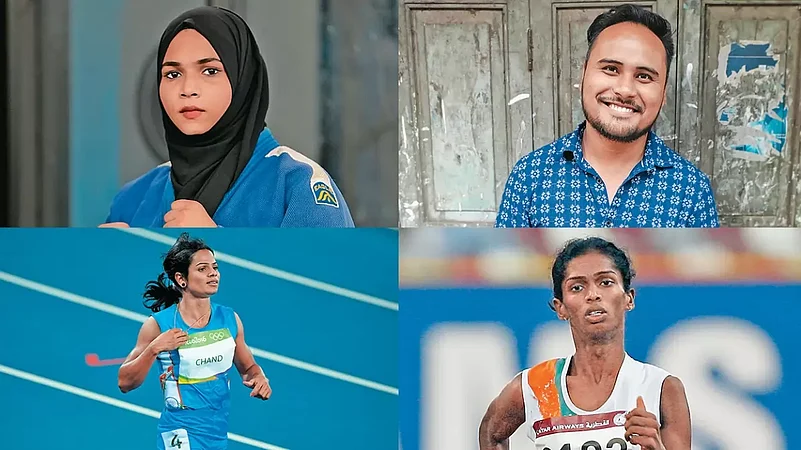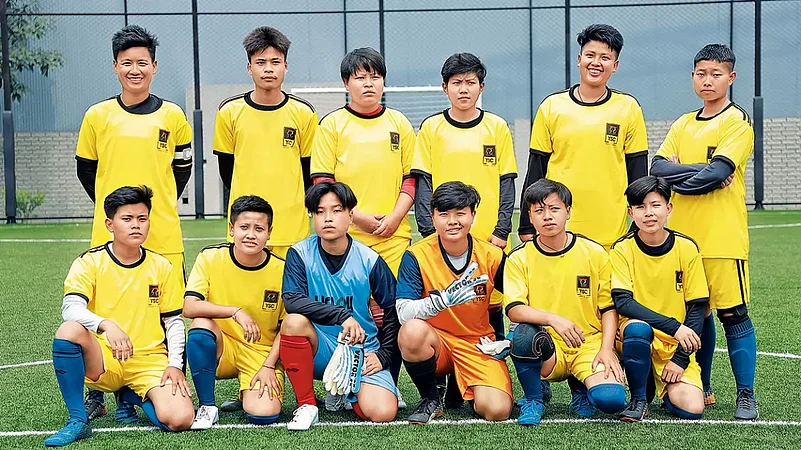A non-conformist by choice, Anamika, the hijabi woman hailing from Kozhikode in Kerala, walks into history for multiple reasons. She is the first transgender woman in Kerala who, a day before the district-level competition on July 29, 2022, won the right for transgenders to participate in sport events of their choice, . She is the first transgender woman in India to win a gold medal at the state-level judo championship for women in December the same year. She won another gold medal at a district-level competition in Kerala in 2022. Even after winning the gold at the event, Anamika had to push the legal fight further to get an entry into the state-level championship, in which she won a bronze medal. The list of her firsts doesn’t stop here. The Kerala Kurash Association recently selected Anamika as referee for the state-level Kurash competitions for both the men and the women categories.
How Queer People Are Making Their Presence Felt In The Sports World
Despite structural discrimination of many kinds, the queer community is making it big in the world of sports

Though not a Muslim, Anamika wears a hijab. She participated in the women’s category for judo, but she identifies herself as transgender. Why stick to stereotypes?
Anamika breaks multiple stereotypes.
A Never-ending Battle
In July 2022 that the Kerala High Court passed an interim order on a petition filed by Anamika stating that transgender persons have every right to participate in a sport event either in the male or female category if there is no separate category for transgender persons. The high court relied heavily upon the landmark judgment by the Supreme Court in the National Legal Service Authority vs. Union of India, pronounced in 2014. The apex court had ruled that one has the right to live with his self-perceived gender identity and the same should not be a reason for any kind of discrimination. The court ruled that transgender people have to be considered as a third category, apart from male and female, and should be allowed to enjoy all the fundamental rights guaranteed under the Constitution.
Though the verdict elaborately delineated various categories of people that come under the umbrella term transgender, gender fluidity continues to remain a tough nut to crack as far as Indian sports is concerned. Two months after the historic judgment, Dutee Chand, an internationally acclaimed sprinter and openly lesbian athlete, failed a ‘gender test’. She was dropped from the 2014 Commonwealth Games by the Athletics Federation of India for having tested positive for hyperandrogenism and she left the track with a heavy heart. “Having a high androgen level is a natural condition. The normal value for women is 1–3 and for men is 3–5. Mine was 3.05,” says Chand to Outlook, and hoped that no person would be discriminated against like her for a naturally occurring physical condition.
Thankfully, her ordeal did not last long. The Court of Arbitration for Sports approved her appeal and held that there is no scientific evidence to prove that high levels of testosterone in a female athlete leads to better performance. Her battle forced the International Association of Athletic Federations to change the hyperandrogenism rules set by it.
However, Chand recently hit the headlines for failing a dope test. Traces of selective androgen receptor modulators were found in the samples tested on December 5, 2022 in Bhubaneswar. She was provisionally suspended by the National Anti-Doping Agency. If she fails another test, she could be banned for four years. According to her, the medicines and hormone supplements she takes for her condition might be the reason for the dope test being positive. “I have done nothing wrong,” maintains Chand.

Chand has no doubt about her gender identity and does not identify herself as transgender or intersex. Having high level of male hormones does not change her identity as a woman. Still, she had to undergo the humiliating experience of a gender test. Despite the highest court settling the issue, gender fluidity remains to be too abstruse to comprehend while addressing the question of performance in sports.
Forsaken by Their Own Country
As the understanding of gender fluidity has changed a lot, athletes like Chand could make a comeback, though she lost the opportunity to compete in the 2014 Commonwealth Games. That was not the case with Santhi Soundarajan, a track and field athlete from Tamil Nadu, whose career came to an abrupt end in 2006, when she tested positive for having high levels of male hormone.
Apart from winning nearly 50 medals for her home state, Soundarajan has won 12 medals in international events for the country, including a silver medal at the Doha Asian Games in 2006. Her parents, who are daily wage workers at a brick kiln, did not have a TV set to watch their daughter win the medal. However, she was stripped of the medal after she failed the gender verification test. A Dalit from rural Tamil Nadu, Soundarajan grew up in abject poverty. She was clueless about what to do. “There was no one to help. Not only did my career but my whole life ended there,” rues Soundarajan.
Being unable to cope with the grief and humiliation, Soundarajan tried to commit suicide by consuming poison. Staring at a bleak future, she joined her parents as a daily wage worker. Neither the central government nor the state government extended any relief to her in terms of a job despite human rights defenders demanding the same. She had to wait another 10 years before she was appointed an athletics coach with the Sports Authority of Tamil Nadu in 2016. “Caster Semenya was given her medal back, but no one considered my pleas. I was discriminated against for no reason,” Soundarajan tells Outlook.
Like Soundarajan, Semenya, the South African middle-distance runner and three-time world champion, had failed the gender test. But Semanya was declared an intersex person, after which she resumed her career. She was allowed to retain her medals and was chosen to carry her country’s flag in the 2012 Summer Olympics.
Not all Stories are Grim
A team of five transgender women in Madurai in Tamil Nadu set an example by smashing the stereotype around Jallikattu as a masculine sport. Jallikattu, a kind of bull fight in Madurai district as part of Pongal celebrations, is not just a sporting event. It has been perceived as a symbol of cultural identity. Keerthana, a transgender woman in Madurai, is a successful bull trainer, who inspired a few others from the community.
Since childhood, Keerthana was familiar with cattle as she was born into the shepherd community. When she realised her transgender identity, the only option for her was to run away from the village. “I reached Mumbai at the age of 13 and lived there till I was 19, having little contact with my family,” Keerthana recalls. As fate had it, she got an opportunity to act in a Tamil movie. “My family found me only when this film was released. After that, they accepted me and I went back to them,” Keerthana tells Outlook. It was a slow and painful process as she had to go home only at night in the initial years.
Back in the village, she reconnected with her bulls and cows. In the meanwhile, the Supreme Court banned the sport in 2014. Massive protests broke out in Madurai, which is home to Jallikattu. She participated in one of the Jallikattu protests in Madurai in 2017, which had by then spread to many parts of the state. After two weeks of protests, the state government legalised Jallikattu by amending the state Prevention of Cruelty Against Animals Act.

That was a watershed moment for Keerthana too. She started training bulls to participate in Jallikattu. “Now I have six bulls participating in Jallikattu. We train them not to attack men but to avoid collisions and not to get caught,” Keerthana tells Outlook, while explaining the techniques of training bulls with palpable excitement. One of her bulls won in the very first match in 2019. Two of her bulls won the competition at this year’s Jallikattu that took place last month.
Keerthana has now a team of eight persons from the queer community training bulls for the sport. According to her, it is hard not only for queer people but also for cis-gender women to bring their bulls in the competition. “The tickets (for bringing bulls) are given mostly to men. We have submitted a representation to the district collector to give priority to more women and transgender persons while allotting the tickets,” Keerthana says.
Talking about inclusion in Manipur
“Nine years have passed since the Supreme Court issued a verdict that there should be a third gender category. The queer community is slowly getting inclusion in all fields, except sports. It is still trapped in the binary of male and female,” says Sadam Hanjabam, the founder of Ya-All FC, India’s first transmen football club in Manipur. In the local language, Ya-All means revolution, while in English it is ‘You all’. Hanjabam, while speaking to Outlook, made it clear that the whole idea is to work towards inclusion. “Football is an emotion in Manipur and we chose to form a football club for the queer community because sports is the best medium to talk about inclusion here,” he says.
Ya-All was launched on March 8, 2020, with 15 queer men on board. The club organises matches every year with all the frenzy of football mania. Hanjabam, who identifies himself as gay, realised from his own bitter experiences of alienation the need to have a support system in place for the community. He talks about his days at the Tata Institute of Social Sciences in Mumbai, where he had pursued a PhD, and how he reached the decision to form Ya-All. “I was addicted to substance use during my student days. Even the doctors never tried to understand the struggles a queer person had to go through. So, I decided to build a support system for all the members of the queer community,” Hanjabam says. He launched ‘Ya All’, a non-profit organisation, for queer people.
However, the queer community gets little support from sports authorities. “Women’s football or women’s cricket team in India do not get the kind of attention and support as men’s team gets. Then what is there to talk about queer people’s sports?” Hanjabam asks. Despite making several attempts, governments keep turning their back on their demand to create a third gender category in sports. “For the fear of being dropped out of the team, there are many who continue either in male or in female team. I know many of them. They are scared to come out. If they do, either their sports career will come to an end or they will be stripped of their medals. We know what happened to Dutee Chand and Santhi Soundarajan,” Hanjabam states categorically.
It is pertinent to recollect what the highest court had observed in its NALSA judgment: “Gender identity is one of the most-fundamental aspects of life which refers to a person’s intrinsic sense of being male, female or transgender or transsexual person. Each person’s self-defined sexual orientation and gender identity is integral to their personality and is one of the most basic aspects of self-determination, dignity and freedom and no one shall be forced to undergo medical procedures, including SRS, sterilisation or hormonal therapy, as a requirement for legal recognition of their gender identity.”
But it is easier said than done.
(This appeared in the print edition as "Taking the Bull by Its Horns")
- Previous Story
 Women's T20 World Cup: New Zealand Knock India Out; Seal Semi-Final Ticket After Humbling Pakistan In Dubai
Women's T20 World Cup: New Zealand Knock India Out; Seal Semi-Final Ticket After Humbling Pakistan In Dubai - Next Story





















